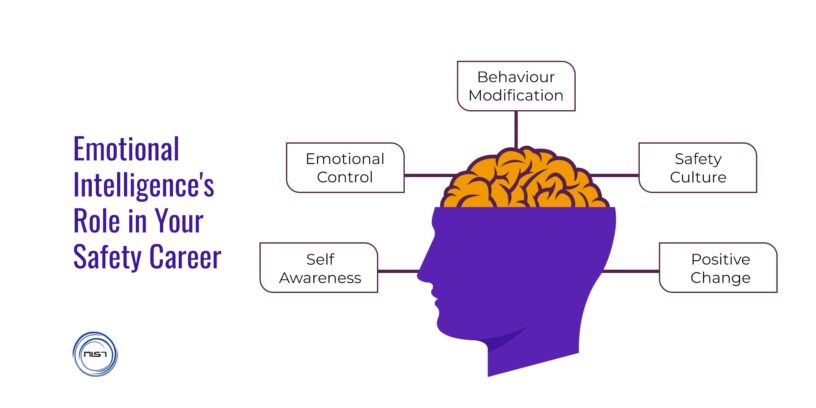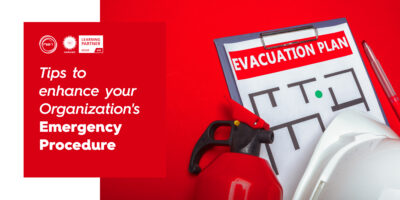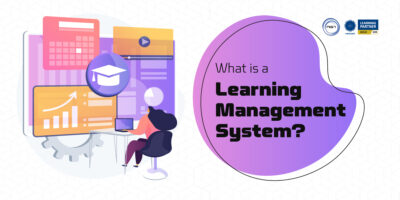Do you know? EI is responsible for 58% of professional success, regardless of job category. Emotional intelligence (EI) is an important quality for a safety professional to possess. It refers to the ability to understand, control, and use your emotions. In this article, we will briefly outline the role of emotional intelligence in your safety career and will introduce some tips and techniques that we use to build safety teams that help people be more effective. Emotional intelligence is the ability to identify your feelings and use them efficiently to make smart decisions.
Good safety professionals understand how their behavior affects others and take steps to address their mistakes. They should also be able to recognize if someone is being affected by their emotions and be able to provide assistance. Also, a good safety manager needs to have excellent emotional intelligence. The ability to perceive and feel emotions is essential for a perfect safety manager.
Ideally, they should be aware of their emotions at all times and be able to control their behavior accordingly. They should also be able to recognize the emotions of others and effectively communicate with their team. This way, they can make informed decisions about the safety of their team members’ work environments. A poor understanding of emotions can lead to poor decisions and dangerously unstable work environments.
EI contributes to a healthy team rapport:
Emotional intelligence (EI) is one of the more significant skills that a leader or an Emergency Responder needs to have. This is one of those things that you learn or learn to develop, but once you do, you start seeing a pattern in the behaviors you have exhibited as you progress through life and it really starts to make sense.
Good emotional intelligence leads to effective communication with your team. Being open and candid about your feelings helps you connect with others on a personal level. You can do this by expressing your thoughts clearly and openly without holding back. This builds trust between you and your team members, which will help you effectively manage them. You should also encourage members of your team to openly discuss feelings they have so that you can create a cohesive team based on strong interpersonal relationships. This allows team members to identify potential safety issues before they become problems for the entire organization.
There are various ways that people describe EI and there are a number of skills that are developed through practice and experience.
In the safety field, emotional intelligence is important in a few ways:
- As you build or coach teams, it is essential that you use emotional intelligence skills to build effective teams and teams that you can trust.
- It is also a part of your safety career when you are evaluating if you need to work on your own emotional intelligence or that of your team.
- It is one of the best indicators of your readiness to be promoted.
Why is Emotional Intelligence Important in a safety career?
Safety is a career in which you must have emotional intelligence (EI) to perform the duties of your job. Emotional intelligence is an individual’s ability to perceive, control and deal with their emotions. When your EI is high you can understand your emotional triggers and work to overcome any negative outcomes. Your EI and safety awareness will be your key to success in this industry.
As an industrial safety professional, the ability to control or prevent work-related accidents and injuries is one of the most important tools at his/her disposal. However, many professionals in the Safety industry, including some Safety supervisors and managers, have little or no formal training in what is viewed as a critical but often overlooked tool: understanding and using one’s own emotions.
How can we help people to better manage their emotions?
One example is that people who have little or no training in a particular technical field are sometimes expected to deal with situations that may be difficult for them emotionally, or that may cause them to make inappropriate decisions. For example, an inexperienced worker who is dealing with a live wire, a very dangerous substance, or a moving piece of machinery, may feel fear, worry about getting hurt, or may have an emotional reaction to their situation. If the worker is uneducated or doesn’t have experience in this type of situation, then they may find it difficult to think and act clearly, and they may be unable to make the right decision.
The other example is an employee who is not well informed, or who misunderstands the true cause of a problem, such as a safety violation. The emotional response is likely to be anger, frustration, or even rage. If this individual is not trained to identify the true cause of a situation, and to think clearly, then their emotional response may cause them to make poor safety decisions, or to make unsafe decisions.
Proper Behaviour-based training helps employees to better understand their emotions and use their emotions effectively. If employees are well informed and well trained, then they can make good decisions.
Emotional Intelligence vs Leadership Skills:
It is important to remember that emotional intelligence skills can be trained, but they are not the same as leadership skills.
However, Emotional intelligence is a vital part of leading people. It is not only important in building teams, but it is essential in leading yourself. It is important to help others feel comfortable and safe with you and understand that you are a safe person to be around.
When you lead, it is important to help others feel good, safe, and comfortable. It is important to know how to develop trust and build a connection with others. It is important to have the ability to communicate effectively. It is important to help your people develop their own leadership skills, but you also have to help them develop their own Emotional Intelligence.
Become a more effective leader:
Another way that emotional intelligence helps you to be more successful in your safety career is that it will help you become a better leader. Learning to be a better leader will also help you become a better team member. When you are able to learn to become a more effective leader, it will help you build relationships that will make people feel comfortable with and trust you. As you learn to build trust, it will help your teams feel comfortable with you and with each other. Once you are able to build relationships that feel comfortable and safe, it will start to help you in your decision-making process.
Emotional intelligence is an essential quality for a good safety manager—both as an informed decision-maker and as a communicator. Without it, managers cannot effectively manage others or communicate with their team members. To be an excellent manager, you must be cognizant of your own emotions as well as those of others when performing your job duties. Informing yourself keeps you from making uninformed decisions, while strong communication keeps everyone on the same page. Essentially, excellent emotional intelligence makes everyone feel safe at work! Lead, coach, and evaluate your own EI: It is important to remember that improving emotional intelligence is a lifelong process. You will need to continue to practice and help yourself learn how to become more effective at emotional intelligence. As you continue to practice, you will start to see improvements.
Why NIST?
A high level of emotional intelligence will pave the way for an effective behavior-based safety culture among employees in an organization, resulting in improved safety culture and increased productivity. NIST has been assisting clients with these types of behavior-based issues by implementing an effective behavior-based strategy and specific intervention techniques. NIST experts create vision-based unsafe act detection for monitoring your workforce’s behavior and training through experimental research, which aids in the elimination of risky behavior and the establishment of a safety culture. Happy Learning!














Leave a Reply